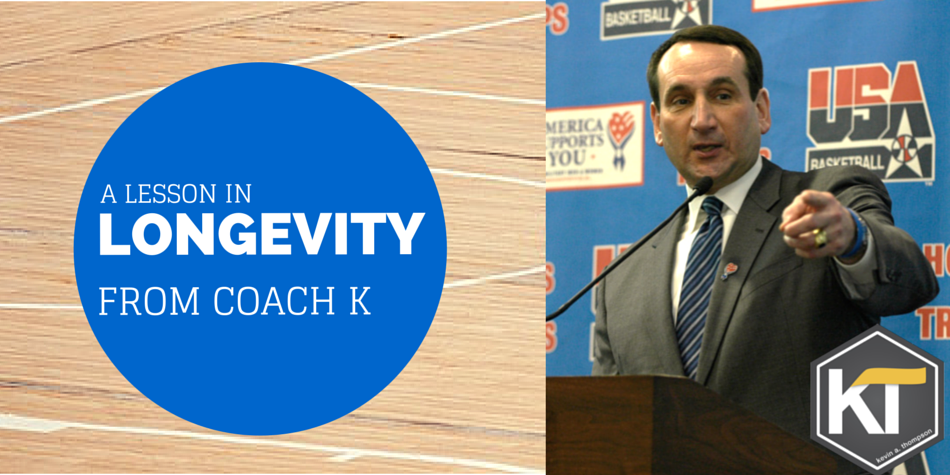Every leader wants two things—success and longevity. I’ve never met someone who wants to win just one championship or have one good financial quarter or to hold a dream job for one year. Success is important, but so is sustaining that success to show it wasn’t just a moment of luck or a fluke.
Few people symbolize long success like Coach Mike Krzyzewski of Duke University. On January 25, 2015, Coach K won his one-thousandth game as a head basketball coach. Through 34 years at Duke and after five years at Army, Krzyzewski has established the greatest coaching career in college basketball history.
But how? (See: Leadership–Learning to Take a Punch)
In the midst of tremendous change, how has Coach K been able to sustain success?
I have little doubt there are many aspects of his philosophy which are unchanging. Certain principles work no matter the time, field of study, or task.
Yet there is one secret to Krzyzewski’s success which many people would overlook.
In 2005, Krzyzewski took over USA Basketball. He turned around the program from a struggling organization and returned it to the elite International program in the world.
At the time, the move appeared as though Coach K was testing the waters for a possible foray into professional basketball. He had notoriously been courted on multiple occasions when legendary NBA franchises had openings. Each time he turned down the position. Many believed leading the national team would allow him to test his system with professional athletes. (See: 7 Leadership Lessons from Gus Malzahn)
However, what few realized was that Krzyzewski’s new gig was likely the key to even longer success in the college game.
Many assistants and players credit the national team with keeping Krzyzewski fresh, giving him new ideas, and renewing his love for the college game. Not only did his experience with the national team give him even more credibility with college recruits, it aided him in applying the latest techniques to his familiar setting.
No one knows the outcome if Krzyzewski had never agreed to a second job as the head of USA basketball, but few people doubt that his move helped extend his time with Duke basketball. (See: 8 Leadership Lessons Ella Taught Me in her First 8 Years)
Consider:
You don’t experience long term success by doing the same thing year after year. Successful longevity demands change and often requires a leader to develop new roles for himself in order to stay engaged in the daily grind of success.
While many of Coach’s K’s principles are the same today as when he was coaching at Army, how he approaches those principles and the way he leads have probably changed a multitude of times over the years.
It’s said of marriage that when a man is married to a woman for 50 years, he’s actually been married to four or five woman. A newlywed is not the same as a young mother who differs from an empty nester who is unique from a retired grandmother. People change. Relationships change. The times require different methods and mindsets.
Long-term success does not occur by applying the same methods the same way for a number of years. As a matter of fact, few things ensure failure as much as an unwillingness to change, try different things, and be different people.
One of the best ways for a leader to stay engaged in one position for a long period of time is to find other outlets which require new skills, bring new insights, and reinvigorate the leader’s heart.
For Coach K, this meant coaching an additional team.
For us it might mean:
- Taking a class
- Teaching a class
- Mentoring a young leader
- Getting a side job
- Volunteering
- Learning a new skill
- Shifting the area in which we give direct oversight
- Blogging
- Podcasting
Few leaders understand the value an intentional change can bring to their energy and desire. While they should never quickly shift gears because of a tough season, they should be aware of the importance of keeping their hearts fully alive. Sometimes to walk longer, you have to take a step which looks like it’s headed in the wrong direction. (See: Dangerous Leadership–When Power Intersects a Lack of Appreciation)
Mike Krzyzewski may be a one-of-a-kind leader. His success may not be duplicated. However, his approach of reinvigorating his heart outside of his organization so he can give his heart fully to his organization is one every leader should study.




One Response to A Lesson in Longevity from Coach K